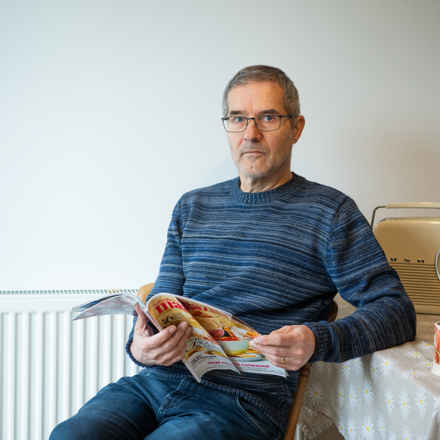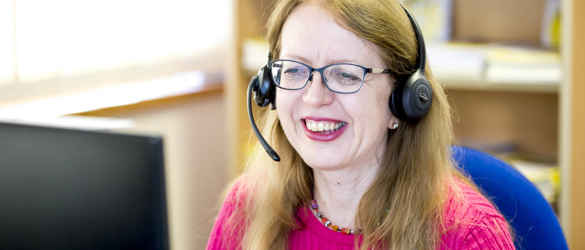"I can now look forward to the future with a degree of hope and confidence"
Posted: Wednesday 04 September 2024
In the aftermath of his diagnosis, Simon was left feeling fearful and full of anxiety.
But a year after receiving the devastating news that he had central retinal vein occlusion (CRVO), the 63 year old tells us how he has managed to come to terms with his condition.
Reflecting on what he described as a ‘traumatic’ time, Simon described how he noticed a blur in his vision, which he initially ignored and hoped would go away.
A week later he was persuaded to go the hospital by his wife. “I don't know what I was thinking about at the time because I didn't know much about eyes,” he said. “I’d known people who'd had age-related macular degeneration (AMD) but I didn’t think about that. I wondered if I had a detached retina or something.”
Life-changing diagnosis
But the news he received was life changing and Simon was frightened by the mention of injections in his eyes, to treat the condition.
He said: “It was all very factual. There was little empathy and when the consultant talked about eye injections, that freaked me out. So you're then left processing all this information. I had loads of questions and I didn’t know whether it was going to recover or not. You're just left in the dark, not knowing about what the future holds.
“In retrospect, it was quite traumatic. I came out of it not knowing where to get answers, I wasn’t due to be seen again for another six weeks.”
Simon was put in touch with the Macular Society’s Counselling Service, having found out about the charity through a leaflet in his local hospital. But the support came months after his diagnosis and he’d already noticed a significant knock to his confidence.
Impact of counselling
“I would say it was such a significant thing with me moving forward,” he said. “I had been through some negative experiences and I can only compare losing my sight to the bereavement change cycle, where initially you start off in denial and then you're angry, and then hopefully at some point you go out the other side and see that there is life, you're still alive.”
The professional help Simon received set him on a path towards acceptance.
Simon said: “I think what the counselling did for me was it accelerated that process, because even though I was supported by family and friends, they didn't have the understanding, the knowledge, the experience to really understand what I'd actually gone through. I think having someone totally objective, someone totally removed from my circle of friends and family that I could just be totally honest with and say how I was feeling. She would listen and ask things, but just to help me process it all.
“I can't overestimate the value of that and the benefits that I personally gained. It was quite a dark time early last year particularly, so without that counselling support I'm not sure how I would have come through that.”
He added: “I would certainly recommend counselling because it enables you to process what's happened and move forward from a place of depression, anxiety or whatever you are feeling, to a place where even though physically nothing may have changed, you can now look forward to the future with a degree of hope and confidence.”
"Powerful" effect of therapy
And a year on from his initial diagnosis, Simon is positive for the future.
“I'm certainly more positive moving forwards in 2024 than I was going into 2023 and I would say a lot of that is down to my counselling I received. A year ago I had a lot of fears and anxieties and emotions but I gave myself permission to feel what I was feeling. It was very powerful.
“Counselling can only be of benefit to your recovery emotionally, perhaps it might not be able to cure you, but at least it can help support you during that journey of transitioning from where you were before to where you need to be.”
Looking for support or advice?
Please contact the Macular Society Helpline on 0300 3030 111 or email help@macularsociety.org who can refer you to counselling if needed.
Macular Society Helpline
Free information and support to those with macular disease, along with their family and friends, to help people retain their independence.
Free counselling and emotional support for sight loss
Are you dealing with the emotional challenges of macular disease? It can help to speak to a professional counsellor, who is trained to listen and to talk through your feelings and help you find ways of dealing with them. Use our free service today.




